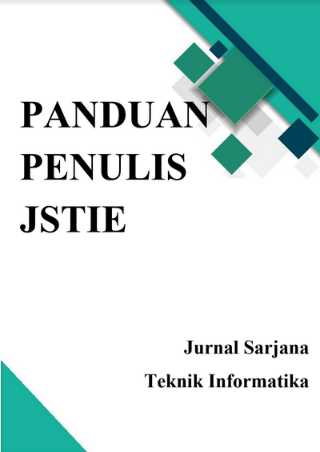RANCANG BANGUN APLIKASI ANDROID SPECIALIST INTEREST GROUP (SIG) DI TEKNIK INFORMATIKA UNIVERSITAS AHMAD DAHLAN YOGYAKARTA DENGAN MENGGUNAKAN METODE GOOGLE CLOUD MESSAGING
DOI:
https://doi.org/10.12928/jstie.v4i3.10794Abstract
Specialist Interest Group (SIG) atau kelompok minat khusus merupakan suatu grup atau kelompok sharing ilmu pengetahuan dari berbagai macam bidang minat ilmu pengetahuan khususnya dalam bidang Informatika. Ketika kegiatan SIG terkadang mahasiswa yang sudah mendaftar dan yang mengikuti tidak hadir dalam kegiatan presentasi SIG, dikarenakan mahasiswa tidak mengetahui jadwal kegiatan presentasi SIG yang sudah di posting-kan di website TIF. Belum adanya layanan keterangan judul presentasi SIG di menu presensi, belum adanya layanan push notifikasi untuk jadwal presentasi SIG, dan sosialisasi belum menyeluruh ke semua dosen. Tujuan dari penelitian menghasilkan aplikasi Android Specialist Interest Group (SIG) untuk penyebaran informasi mengenai jadwal kegiatan presentasi SIG dapat lebih luas, mudah, karena selama ini pemberitahuan informasi kegiatan presentasi SIG hanya diposting di website TIF.
Metodologi yang digunakan yaitu melakukan pengumpulan data menggunakan metode penyebaran kuisioner, wawancara dan studi pustaka, lalu dilakukan analisis data untuk menentukan kebutuhan user dan kebutuhan sistem. Tahap pengembangan sistem berupa perancangan sistem yaitu perancangan proses menggunakan UML (Unified Modeling Language) dan pemodelan data menggunakan ERD (Entity Relationship Diagram). Implementasi sistem menggunakan Java Android, Framework Codeigniter, Google Cloud Messaging (GCM) dan web service. Pengujian sistem dilakukan dengan metode Black Boxt Test dan User Acceptance Test.
Dari penelitian yang dilakukan menghasilkan sebuah aplikasi Android Specialist Interest Group dan web SIG untuk digunakan mahasiswa dan koordinator SIG dalam kegiatan presentasi SIG. Hasil pengujian sistem metode user acceptance test yaitu untuk perangkat lunak didapat pengujian aplikasi Android Specialist Interest Group (Diterima) 88,68% dan (Diterima dengan catatan) 11, 08 % sehingga aplikasi dikatakan diterima.
Kata Kunci: Android, Google Cloud Messaging, Specialist Interest Group, Web Service
References
Andrianto, E., 2013. Pengembangan Aplikasi Lagidimana Berbasis Android. Universitas Ahmad Dahlan, Yogyakarta.
Ramadhan, T., G Utomo, V., 2014. Rancang Bangun Aplikasi Mobile Untuk Notifikasi Jadwal Kuliah Berbasis Android (Studi kasus: STMIK PROVISI SEMARANG). J. Teknol. Inf. Dan Komun. Volume 5 No 2.
Santoso, A., 2014. Pembuatan Aplikasi Mobile Broadcast Informasi Perkuliahan Berbasis Android. J. Infra Volume 2 No 1.
Aprillia Praminingtiyas, E., 2014. Rancang Bangun Aplikasi Job Vacancy Notification Pada Perangkat Mobile Berbasis Android. Repos. J. Mhs. PTIIK UB Volume 4 No 2.
Widhiyanti, K., N.D. Soetarmono, A., 2014. Perancangan Aplikasi GEO-Location Sharing Dengan Location Based Service Pada Sistem Operasi Android. Teknika Volume 3 No 1.
Wibowo, M., Yuliansyah, H. 2014. Location Based Service Application Design for Mobile Promotion SME’s Product and the Nearest Bank Service Information. International Conference on Green World in Business and Technology 2014. 29 Maret 2014 2014.
Yuliansyah, H., & Novitasari, I. D. 2015. M-Zoo: Aplikasi Android Dengan Konsep Layanan Berbasis Lokasi Untuk Informasi Pengenalan Satwa Di Kebun Binatang. TECHSI-Jurnal Teknik Informatika, 7(2).
Yeyen Meithia Putri Jalni, Herman Yuliansyah. 2015. Rancangan Aplikasi Web Monitoring Estimasi Kedatangan Bus Trans-Jogja Berdasarkan Lokasi Bus Dengan GPS Smarthone. Simposium Nasional Teknologi Terapan (SNTT) 2015, Forum Grup Diskusi Teknologi Perguruan Tinggi Muhammadiyah Se-Indonesia.
Anggriana, F., & Yuliansyah, H. 2015. Rancang Bangun Aplikasi Baby Care Untuk Mencatat Perkembangan Balita Berbasis Android Dengan Metode Indikator Antropometri. JSTIE (Jurnal Sarjana Teknik Informatika)(E-Journal), 3(3).
Yuliansyah, H., Wibowo, M., Arisandy, W., Budiarti, A. 2013. Rancangan Aplikasi Informasi Jadwal Perkuliahan Berbasis Mobile (Studi Kasus Fakultas Teknologi Industri Uad). Seminar Teknik Informatika (STI) Program Studi Teknik Informatika Universitas Ahmad Dahlan. 27 Maret 2013.
Rais, A., & Yuliansyah, H. 2015. Apikasi Pemandu Museum Gunungapi Merapi (Mgm) Dengan Konsep Layanan Berbasis Lokasi Dalam Ruangan Menggunakan Qr Code. Jurnal Informatika, 9(2).
Tedy Setiadi, Herman Yuliansyah. 2015. Kampung Wisata Online Berbasis SIG sebagai Upaya Meningkatkan Partisipasi Warga dalam Mengelola dan Mempromosikan Pariwisata Kota Yogyakarta. Jurnal JARLIT. 11(1). 85-91.
Sommerville, I., 2007. Software Engineering 8th ed., Pearson Education Limited.
Issue
Section
License
License and Copyright Agreement
In submitting the manuscript to the journal, the authors certify that:
- They are authorized by their co-authors to enter into these arrangements.
- The work described has not been formally published before, except in the form of an abstract or as part of a published lecture, review, thesis, or overlay journal. Please also carefully read Journal Posting Your Article Policy.
- The work is not under consideration for publication elsewhere.
- The work has been approved by all the author(s) and by the responsible authorities – tacitly or explicitly – of the institutes where the work has been carried out.
- They secure the right to reproduce any material that has already been published or copyrighted elsewhere.
- They agree to the following license and copyright agreement.
Copyright
Authors who publish with Jurnal Sarjana Teknik Informatika agree to the following terms:
- Authors retain copyright and grant the journal right of first publication with the work simultaneously licensed under a Creative Commons Attribution License (CC BY-SA 4.0) that allows others to share the work with an acknowledgement of the work's authorship and initial publication in this journal.
- Authors are able to enter into separate, additional contractual arrangements for the non-exclusive distribution of the journal's published version of the work (e.g., post it to an institutional repository or publish it in a book), with an acknowledgement of its initial publication in this journal.
- Authors are permitted and encouraged to post their work online (e.g., in institutional repositories or on their website) prior to and during the submission process, as it can lead to productive exchanges, as well as earlier and greater citation of published work.







